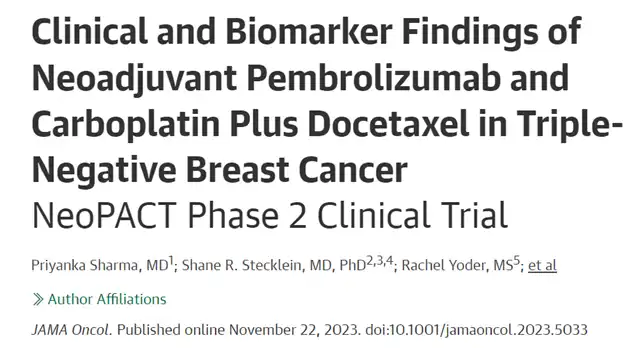Groundbreaking Immunotherapy Combination Shows 86% 3-Year Survival in Tough-to-Treat Breast Cancer
- Normal Liver Cells Found to Promote Cancer Metastasis to the Liver
- Nearly 80% Complete Remission: Breakthrough in ADC Anti-Tumor Treatment
- Vaccination Against Common Diseases May Prevent Dementia!
- New Alzheimer’s Disease (AD) Diagnosis and Staging Criteria
- Breakthrough in Alzheimer’s Disease: New Nasal Spray Halts Cognitive Decline by Targeting Toxic Protein
- Can the Tap Water at the Paris Olympics be Drunk Directly?
Groundbreaking Immunotherapy Combination Shows 86% 3-Year Survival in Tough-to-Treat Breast Cancer
- Should China be held legally responsible for the US’s $18 trillion COVID losses?
- CT Radiation Exposure Linked to Blood Cancer in Children and Adolescents
- FDA has mandated a top-level black box warning for all marketed CAR-T therapies
- Can people with high blood pressure eat peanuts?
- What is the difference between dopamine and dobutamine?
- How long can the patient live after heart stent surgery?
Groundbreaking Immunotherapy Combination Shows 86% 3-Year Survival in Tough-to-Treat Breast Cancer
Survival rate reaches 86% with no events! New adjuvant therapy brings new hope for the “most difficult to treat” breast cancer patients.
The addition of the immune checkpoint inhibitor, Pembrolizumab, to anthracycline-based chemotherapy improves the pathological complete response (pCR) and event-free survival (EFS) in early-stage triple-negative breast cancer (recognized as the “most difficult to treat” subtype). However, there is a lack of studies assessing the effectiveness of non-anthracycline chemotherapy immunotherapy in triple-negative breast cancer.
A recent study published in JAMA Oncology (NeoPACT) evaluated the efficacy of a non-anthracycline neoadjuvant regimen, Pembrolizumab + Carboplatin + Docetaxel, in treating triple-negative breast cancer. The study revealed promising results, with a notable 58% pCR and an impressive 86% 3-year event-free survival.

Screenshot source: JAMA Oncology
The open-label, single-arm, phase 2 clinical trial conducted from September 2018 to January 2022 included 115 female patients aged 18 to 70 with stage I to III triple-negative breast cancer. These patients had not undergone previous systemic chemotherapy or immunotherapy and had not received breast surgery. They underwent neoadjuvant treatment with Carboplatin (area under the concentration-time curve, 6) + Docetaxel (75 mg/m2) + Pembrolizumab (200 mg) every 21 days for a total of 6 cycles, with granulocyte colony-stimulating factor support provided during all cycles. The primary endpoint was pCR, and secondary endpoints included residual tumor burden, EFS, adverse reactions, and immune biomarkers.
During the neoadjuvant treatment, all patients showed no disease progression. Among the 111 evaluable patients for pathological response, the pCR rate and the rate of residual tumor burden 0+1 were 58% (95% CI, 48%-67%) and 69% (95% CI, 60%-78%), respectively. In 83 patients with stage II-III disease and estrogen receptor (ER) and progesterone receptor (PR) <1%, the pCR and residual tumor burden 0+1 rates were 58% and 68%, respectively. The pCR rates for breast cancer TNM stages I, II, and III were 69%, 58%, and 43%, respectively.
Regarding immune biomarkers and response:
In multivariate analysis, four immune biomarkers (stromal tumor-infiltrating lymphocytes [sTIL], tumor immune microenvironment [TIM], DNA damage immune response [DDIR], and PD-L1) were predictive of pCR. sTIL ≥30%, PD-L1 positivity, DDIR positivity, and TIM positivity were associated with pCR. The pCR area under the curve for sTIL, PD-L1, DDIR, and TIM were 0.719, 0.740, 0.699, and 0.715, respectively.
In terms of survival outcomes:
At a median follow-up of 27.4 months, the estimated 3-year event-free survival rate for all patients was 86% (95% CI, 77%-95%); the pCR group was 98% (95% CI, 95%-100%), and the residual disease (RD) group was 68% (95% CI, 48%-88%).
Regarding adverse reactions:
Thirty patients (26.1%) experienced immune-mediated adverse reactions, with 4 patients (3.5%) experiencing ≥3-grade immune-mediated adverse reactions. The most common ≥3-grade immune-mediated adverse reaction was colitis (2 [1.7%]). The researchers did not observe cases of hypophysitis or adrenal insufficiency.
In conclusion, the study results suggest that neoadjuvant Carboplatin + Docetaxel + Pembrolizumab demonstrates encouraging pCR and 3-year event-free survival. The regimen is well-tolerated, and immunologically enriched identification through various biomarkers can independently predict pCR. These findings provide data for a non-anthracycline chemotherapy immunotherapy alternative for triple-negative breast cancer patients who do not meet the criteria for anthracycline treatment, supporting further evaluation in randomized studies as a chemotherapy de-escalation strategy.
Groundbreaking Immunotherapy Combination Shows 86% 3-Year Survival in Tough-to-Treat Breast Cancer
Reference:
[1] Sharma P, et al., (2023). Clinical and Biomarker Findings of Neoadjuvant Pembrolizumab and Carboplatin Plus Docetaxel in Triple-Negative Breast Cancer: NeoPACT Phase 2 Clinical Trial [published online ahead of print, 2023 Nov 22]. JAMA Oncol, doi:10.1001/jamaoncol.2023.5033
(source:internet, reference only)
Disclaimer of medicaltrend.org
Important Note: The information provided is for informational purposes only and should not be considered as medical advice.



